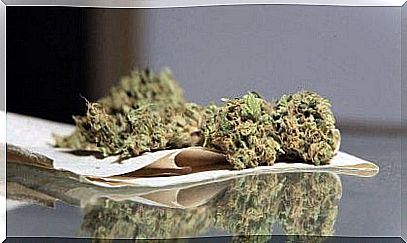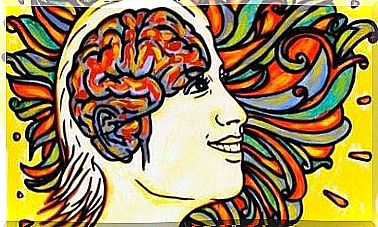Do You Know The Effects Of Marijuana On The Brain?

A few minutes after you smoke marijuana, your heart rate increases, your blood vessels dilate, your eyes turn red, and your blood pressure rises … It is quite clear that the effects of marijuana on the brain and body are great.
Smoking marijuana not only has effects on a physical level. It also affects consumers mentally. We know a lot about the effects of marijuana on the brain. It seems that there are few people today who do not know what marijuana is or what it does. Nevertheless, it is important to stop and remember what this drug really is.
What is marijuana?
Marijuana, or cannabis, is a green or gray mixture of flowers and dried, crumbled leaves from the hemp plant. There are more than 200 names for this drug. People call it Mary Jane, hash and pot to name a few.
Marijuana is the name that the Mexicans gave to the hemp plant in India. This is a species of the family Moraceae (mulberry) and it looks like a thin nettle. It measures about 1.8 meters and can be grown in any warm place. Cannabis is a plant with a long history and tradition, and many uses, due to its properties . People use it recreationally (drugs), medicinal and industrial (as raw material).
Cannabis is originally from Central and South Asia. The Assyrians used it for religious ceremonies, and they called it “qunubu.” Cannabis has a long history in religious ceremonies around the world.

Tetrahydrocannabinol – the primary psychoactive compound in cannabis
The most important active chemical in marijuana is THC (chemical name (-) – trans-A9-tetrahydrocannabinol). THC is the primary psychoactive compound in cannabis, and one of the more than 80 different cannabinoids found in this plant. In fact, THC is the most common cannabinoid in cannabis.
When you use marijuana, whether you smoke, vaporize or eat it , cannabinoids can interact with different receptors in the brain and body. These receptors form part of the endocannabinoid system. Through this interaction, the effects of marijuana on the brain are different for consumers.
THC is the primary psychoactive compound in cannabis and one of the more than 80 different cannabinoids found in the plant.
The membrane of some nerve cells has protein receptors that retain THC . When THC reacts with these receptors, it produces a number of effects in the body. It can cause euphoria, relaxation, joy, among other sensations. There are also cannabis strains that companies use to produce industrial hemp. These strains contain less than 1% THC and are not suitable for recreational use.
The effects of marijuana on the brain
Humans have been using cannabis for thousands of years because of its effect on the mind and body. The effects of marijuana on the brain are a general shift in perception, euphoria and a better mood.
In the same way, the use of cannabis increases appetite and gives consumers a feeling of being “stoned” . The immediate side effects include short-term memory loss, dry mouth, bloodshot eyes, impaired motor skills and anxiety.
In the long run, marijuana can reduce mental capacity and cause addiction. The immediate effects of marijuana last between two and eight hours. If you smoke marijuana, it only takes a few minutes before you notice its effect. If you ingest it, it may take between 30 minutes and an hour before you notice it.
The effects of marijuana on the brain cause changes in perception.

Amotivation syndrome
People often say that marijuana is a harmless drug . However, we should not ignore the many possible negative effects of it. One of these effects that we tend to undermine is amotivation syndrome. The word “amotivation” implies everything that makes us see a marijuana addict as a true “social exclusion”.
According to the psychologist, Vallejo-Najera, a person can go through the following four phases when experiencing amotivation syndrome:
- Euphoria. Feeling of relaxation and happiness. A tendency for dialogue. Stimulates imagination.
- Impulsive hallucination. Fantasies turn into hallucinations, which coincides with the loss of a sense of space and time. This stage is very emotional. Mood swings are intense. If the use of marijuana is accompanied by alcohol, this stage is even deeper.
- Happiness. Feeling of joy, peace and quiet. “Neither desire nor fear.” The person slowly becomes sleepy.
- Sleepiness and inertia. This is the phase immediately after the above. The person is completely incapacitated for a few hours.
The effects of marijuana according to the World Health Organization (WHO)
The subjective effects start one minute after inhalation . The maximum effects of marijuana occur 30 minutes after smoking. This is also the case in the smoker’s subjective plan. The effects can last for about four hours if marijuana is smoked. The effects of ingesting marijuana can last for eight hours. What users talk about the most is their changed sense of time. When people use marijuana, everything seems to last longer than usual.
One of the effects of marijuana that we do not usually pay much attention to is amotivation syndrome.
Users also talk about their increased sound sensitivity and an increased understanding of music. Some people mention a subjective feeling of increased touch, taste and smell. In general, the effects of marijuana on the brain depend on how the consumer ingests it and how much THC it contains. Tetrahydrocannabinol does not dissolve in water. Therefore, ingestion and inhalation are the choices for consumption.
Serious effects of marijuana use
In case of severe poisoning, cannabis can cause paranoid thoughts, delusions, hallucinations, depersonalization, delirium, confusion, agitation and anxiety. It can also cause insane thoughts and disorientation, along with agitation and violent tension. These effects go away after a few hours.
The effects of marijuana on the brain during severe intoxication can cause hallucinations, paranoid thoughts and delirium.

The personality of the consumer also plays a role in the effects of marijuana on the brain. People who are overwhelmed by anxiety, fear and panic can have severe psychotic reactions. They tend to get annoyed, depressed and withdrawn.
The truth is that we should not look lightly at drug use. This is true even of a drug like marijuana that has been around for hundreds of years . Drug use has increased mental health problems among young people. This is particularly disturbing if we believe that the use of marijuana increases the possibility of a psychotic incident. In addition, increases in anxiety and panic attacks are related to regular drug use.
Bibliography
Cáñamo, “official review of cannabis culture”, various issues, edited in Barcelona, Spain.
Valbuena, A., Toxicomaniacs, Medical and Psychiatric Problems, 1986.









